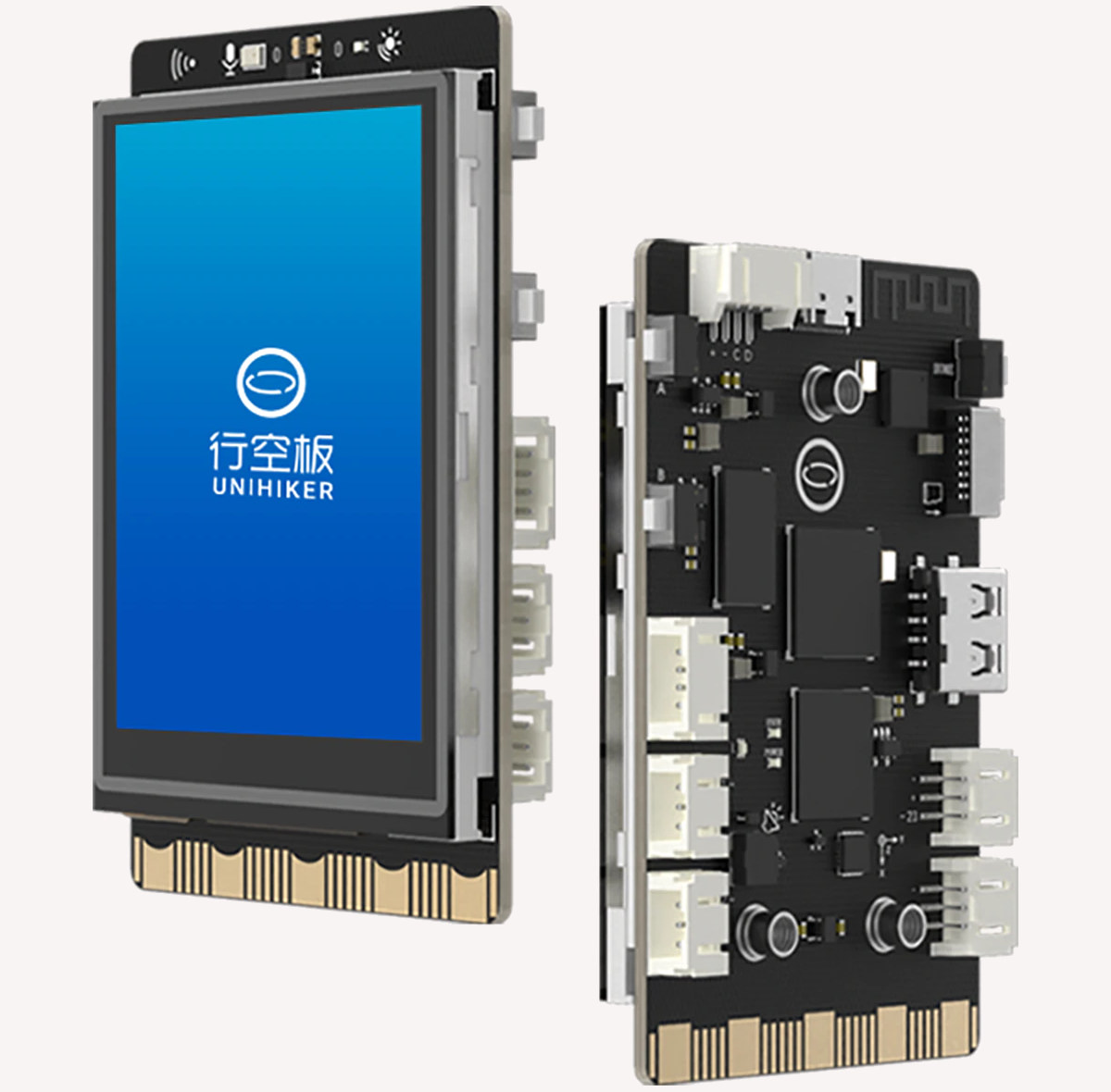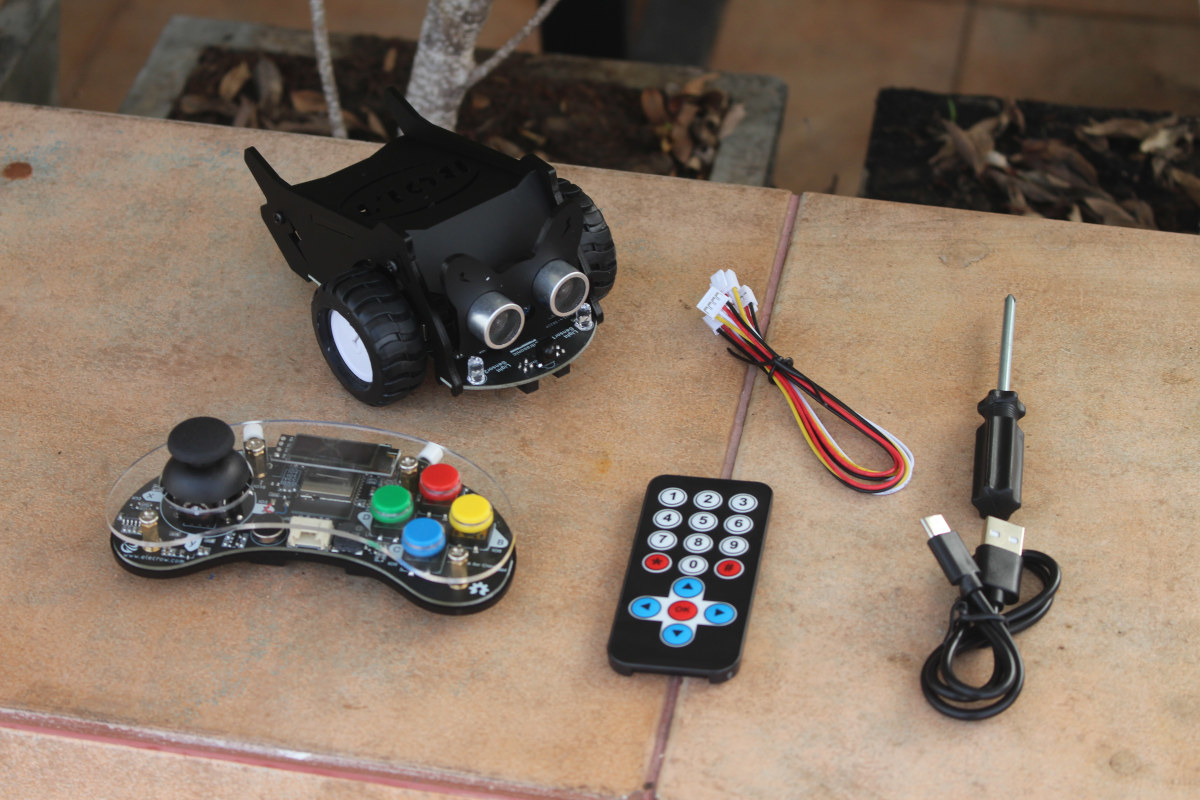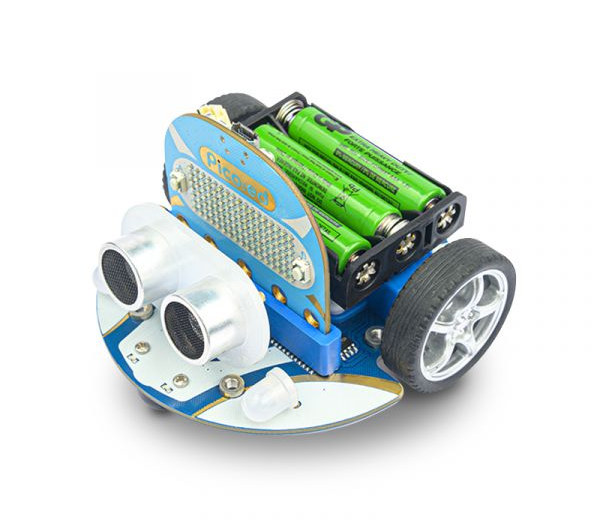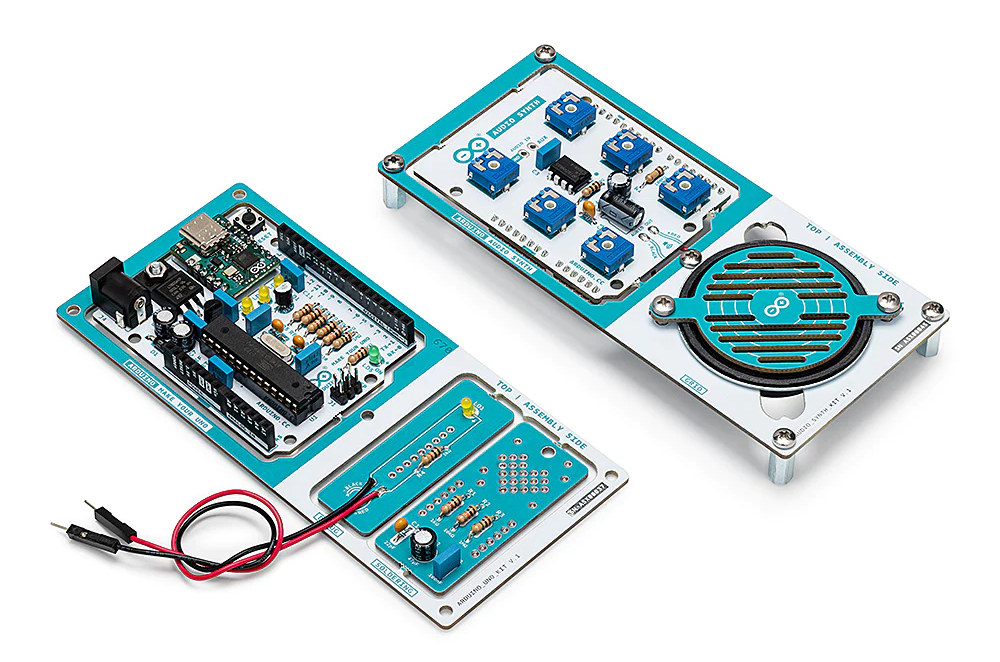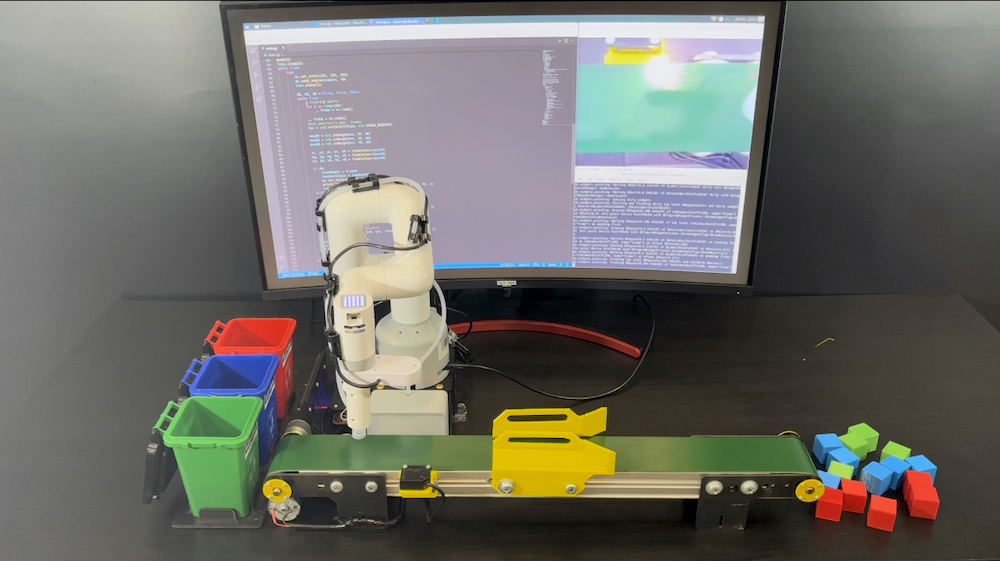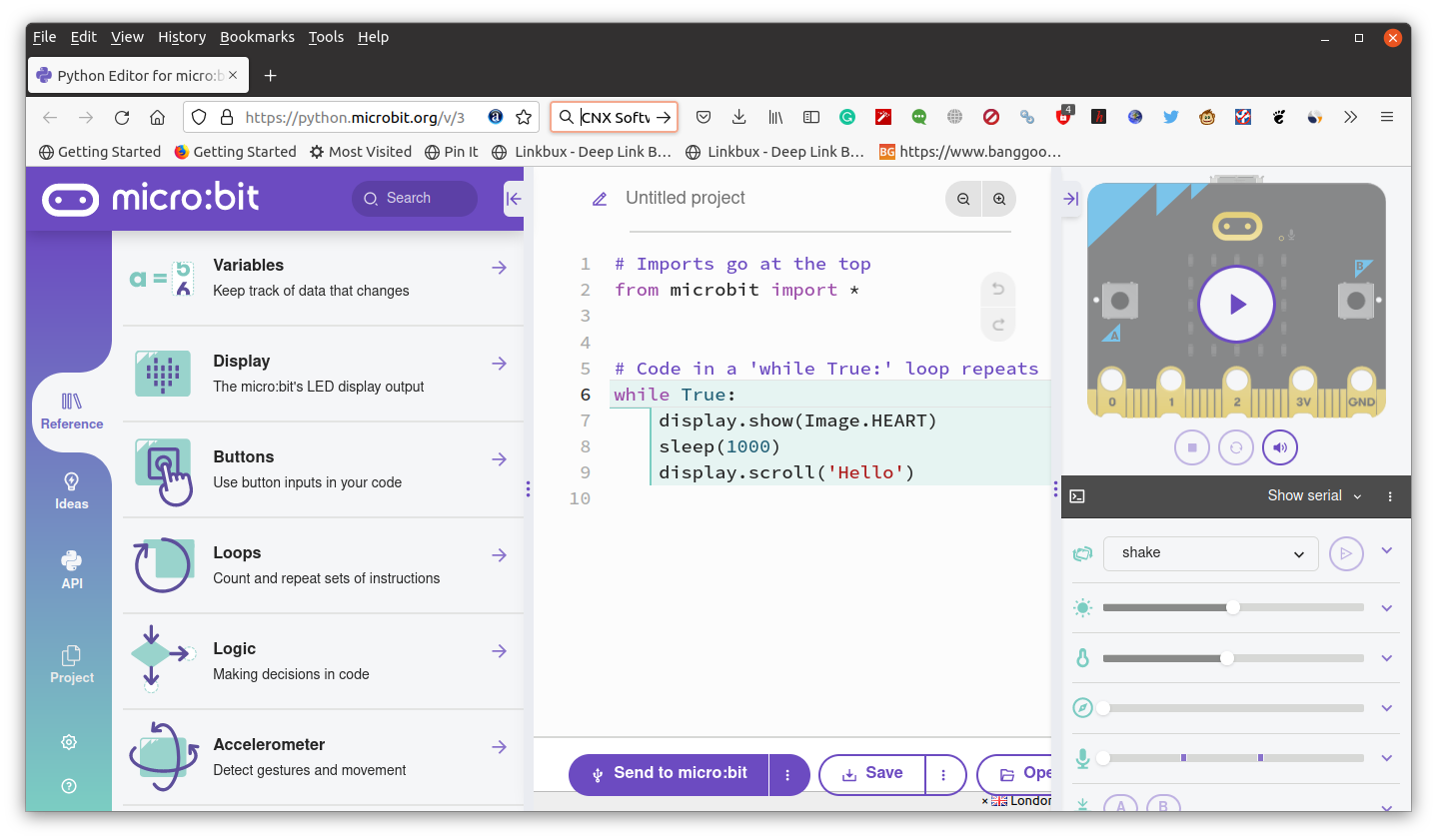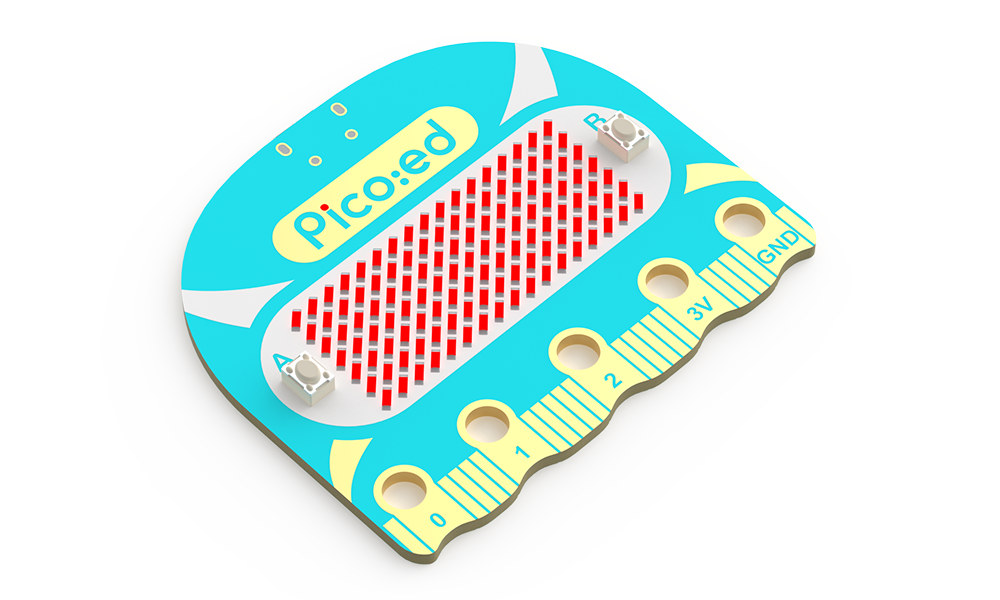DFRobot UniHiker is a STEM education platform with a 2.8-inch touchscreen display, a Rockchip RK3308 quad-core Cortex-A35 processor, a GD32V RISC-V microcontroller, WiFi and Bluetooth connectivity, as well as various headers for expansion, and a BBC Micro:bit compatible edge connector. The UniHiker runs Debian 10 Linux and can be used to teach programming using Mind+ visual programming IDE or Jupyter open-source interface, as well as IoT and AI basics thanks to tutorials and lessons available in Chinese only as the platform clearly targets the education market in mainland China at this point in time. Unihiker specifications: SoC – Rockchip RK3308 Quad-core Arm Cortex-A35 processor @ 1.2GHz without GPU MCU – Gigadevice GD32VF103C8T6 RISC-V microcontroller @ 108MHz with 64KB flash, 32KB SRAM System Memory – 512MB DDR3 Storage – 16GB eMMC flash, MicroSD card socket Display – 2.8-inch touchscreen color display with 320×240 resolution Connectivity – 2.4 GHz Wi-Fi & […]
Getting Started with CrowBot BOLT smart robot car
CrowBot BOLT is a smart robot car based on an ESP32 wireless microcontroller and designed for the education market with the ability to program the robot with visual programming, Arduino, or MicroPython. Elecrow sent me a sample of the CrowBot BOLT kit for evaluation so I’ll have a look at the hardware, show how to assemble it, showcase the features of the built-in firmware, and demonstrate how to program the robot with visual programming, Arduino, and MicroPython using some of the provided code samples. CrowBot BOLT unboxing The package lists some of the highlights with 16 teaching courses, support for multiple programming platforms, scalability with Grove connectors, and the inclusion of the Joystick that’s also programmable. The CrowBot BOLT comes as a kit so there will need to be some work to do to assemble the robot, but no soldering is required (in normal cases, more on that later). The […]
Giveaway Week 2022 – Pico:ed Smart Cutebot Kit
The third prize of this year’s giveaway week comes courtesy of ELECFREAKS which offers a Cutebot Pico:ed kit based on the Pico:ed board with a Raspberry Pi RP2040 microcontroller and following BBC Micro:bit form factor. The kit also includes two high-speed motors to drive two wheels, ultrasonic & distance sensors, two RGB LED lights and clearance lamps on the bottom, two line-tracking probes, and an active buzzer used as a horn. It is powered by three AAA batteries. The company initially me asked me if I wanted to review the board/robot, but since I may not have the time to do so, I asked whether they wanted to be included in our yearly giveaway week which they accepted. The company provides instructions to program the robot with “Micro block” visual programming IDE, C++, and CircuitPython. You’ll find resources to get started and eight projects for the robot in the Wiki. […]
Learn soldering and programming with the Arduino Make Your UNO Kit
Arduino Make Your UNO Kit is a kit with two boards, one for the microcontroller and the other for audio, and all components required that can be used to learn how to solder and then Arduino programming. Once soldering and assembly are complete you’ll hopefully get a working Arduino UNO and an audio synthesizer shield. But before you get there, you’ll need to equip yourself with a soldering iron and some soldering tin to solder the components below to the two PCBs. Package content: Arduino Make Your UNO board’s components Make Your UNO PCB Socket for ATMega328p MCU Microchip ATmega328p 8-bit AVR microcontroller USB Type-C serial adapter board Various 1k Ohm, 10k Ohm. and 1M Ohm resistors 3x Ceramic capacitors (22pF) 3x Electrolytic capacitors (47uF) 7x Polyester capacitors (100nF) 1x 1N4007 diode 1x 16MHz crystal 4x Yellow LEDs, 1x Green LED 1x Push-Button 1x MOSFET 2x I/O connectors 6-pin header […]
DongshanPI-D1s – An Allwinner D1s RISC-V development board designed to teach programming
The DongshanPI-D1s development board is comprised of a soldered-on Allwinner D1s RISC-V system-on-module board (SoM) and a carrier board with two 40-pin headers and a 2.0mm dedicated header. This development board is specifically designed to teach programming with a focus on the RISC-V architecture. The development board was designed by 100ask. They previously designed the Dongshan NeZha STU a development board based on the Allwinner D1. The main difference between the two is that 100ask did not include the Ethernet and HDMI interfaces on the DongshanPI-D1s board. The pinout of the headers is also slightly different because they opted to make the headers compatible with the widely used 40-pin GPIO from Raspberry Pi single board computers. DongshanPI-D1s preliminary specifications: D1s Core Lite SoC – Allwinner D1s single-core XuanTie C906 64-bit RISC-V processor @ 1.0 GHz with with 32 KB I-cache + 32 KB D-cache Memory – 64 MB DDR2 (SIP) […]
Review of myCobot 280 Pi robotic arm with Python and visual programming
myCobot 280 Pi is a versatile robotic arm with a 6 degree of freedom design. It was developed by Elephant Robotics using the Raspberry Pi 4 board as the main controller. The robot is compact and delivers stable operation making it ideal for confined spaces. It can also be programmed in a variety of languages, is easy to use, and offers a lot of features. It is suitable for those who are interested in learning how to program a robotic arm controller and for engineering projects. Unboxing myCobot 280 Pi The myCobot 280 Pi arm has a working range of 280 mm, weighs 850 grams, and can handle a payload of up to 250 grams. It is powered by 6 servo motors, one for each degree of freedom, and comes with a 5×5 matrix LED display, and supports LEGO parts as well. Controlled by a Raspberry Pi 4 single board […]
The BBC has released a new web-based Python editor for the micro:bit board
There are already Python editors such as Thonny, but the BBC thought those were not good enough and released a new web-based Python editor specifically designed for the micro:bit education board targeting 11 to 14 years old pupils. The micro:bit Python editor includes drag and drop code examples, code structure & error highlighting, auto-complete feature, a simulator to test the code before uploading it to the micro:bit board, and a Quick ideas section to help pupils get started with projects. The BBC’s micro:bit Python editor works with both the micro:bit V1 and V2, but note the simulator shows a micro:bit V2, so if you are using the previous generation micro:bit, some code may work on the simulator but not on your micro:bit V2 board. For that reason, the BBC marked the code that only works on a micro:bit V2 with ‘V2’ in the Reference section. While the BCC is a […]
Raspberry Pi RP2040 gets into BBC Micro:bit lookalike board
ELECFREAKS Pico:ed V2 is a Raspberry Pi RP2040 board heavily inspired by the BBC Micro:bit with an edge connector exposing rings suitable for crocodile clips, a 17×7 LED matrix display, and designed for the classroom. We’ve seen several BBC Micro:bit clones – or rather adaptations – over the years with boards such as the SiFive Learn Inventor, Elecrow Mbits, and HiHope “Big Brother” board. The Pico:ed V2 adds to the list, and the main differences are that it is based on the Raspberry Pi RP2040 microcontroller instead, and does not come with wireless connectivity relying on a USB interface only. ELECFREAKS Pico:ed V2 specifications: MCU – Raspberry Pi RP2040 dual-core Cortex-M0+ microcontroller @ up to 133Mhz with 264kB of SRAM Storage – 2MB QSPI flash Display – 17×7 dot-matrix display USB – 1x micro USB 1.1 port for power, data, and programming I/Os 25-pin notched “Wavy” connector with up to […]


